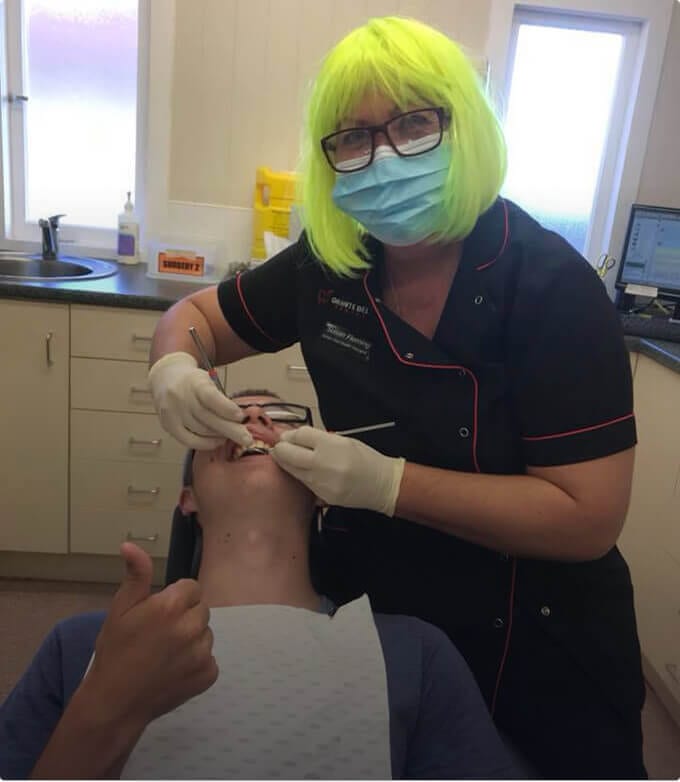
About Tooth Extractions
If your tooth is damaged or decayed beyond repair, we may need to extract it. Our tooth extraction procedure is pain-free. Book an appointment today. At Granite Belt Dental, we will always take every possible measure to help you preserve your natural teeth. In an attempt to save a tooth, your dentist may recommend root canal treatment. Unfortunately root canal is not a suitable solution for every problem, and there are several scenarios which may result in a tooth having to be extracted.
- Significant decay or damage to the tooth- when a tooth is badly damaged enough that reconstructive work (such as fillings and crowns) would not be effective, extraction is sometimes the best treatment
- Periodontal disease- due to poor dental hygiene and a build-up of plaque and calculus (tartar) on a tooth, the gums may become inflamed and infected (periodontal disease). If not treated promptly, periodontal disease is likely to damage the underlying bone and other tissues around the tooth's root.
- To prevent infection- on rare occasions, even after the best care, an infection can occur. If the risk from infection is high, then it may be best to extract the tooth.
- Overcrowding- as part of orthodontic treatment, your orthodontist may recommend removal of teeth. If your teeth are too big for your mouth or extra teeth are coming through that are causing overcrowding and discomfort, a dentist may remove a tooth or teeth to help the rest of the teeth come through easily
- Vertical cracks in a tooth- if a tooth is fractured vertically, a crack may be extending from the chewing surface of the tooth all the way to the root surface. They often show minimal signs and symptoms and may therefore go unnoticed.
Tooth Replacement Options
Your dentist will always discuss options for replacing your extracted tooth with you prior to treatment. If your tooth has been removed, it is important to replace it with a new tooth to avoid bone loss and shifting out of the neighboring teeth. Missing one tooth can affect your dental health in many ways including your confidence, digestion, and nutrition.
We offer a number of modern tooth replacement options to restore your complete, functional smile. Some of the options and procedures we offer include: dentures, crowns, bridges and implants. If you have questions or worries, feel free to ask us about them. Our dentists will be pleased to answer all your questions. We want you to be relaxed and comfortable during the procedure.
Need a Tooth Removed? We’re Here to Help
If you’re experiencing pain or discomfort and think you might need a tooth removed, our experienced team at Granite Belt Dental is here to provide expert care in Warwick and Stanthorpe. We prioritise your comfort and use advanced techniques to ensure the extraction process is as gentle and stress-free as possible. Don’t let dental pain impact your daily life, book an appointment today and let us help you restore your oral health with compassionate, professional care.
Feeling a bit anxious? Visit our blog on Dental Anxiety and How to Cope for practical tips and support to help you feel at ease.
granite belt dental
Other treatments
We’re human& we’re here to help
Fill out this contact form and we’ll be in touch
Wisdom Teeth Extractions
A Few Things You Should Know About Tooth Extractions
At Granite Belt Dental, we will always take every possible measure to help you preserve your natural teeth. In an attempt to save a tooth, your dentist might recommend root canal treatment, but sometimes, this isn’t a suitable solution, and we might suggest an extraction. In other instances, such as wisdom teeth extractions, having teeth removed will eradicate pain and discomfort in the future. We understand that the words ‘tooth extraction’ likely spark fear, but the procedures and techniques of the old days are long gone. The team at Granite Belt Dental use pain-free, cutting edge methods to make your extraction seamless and pain-free.
Why Might You Need A Tooth Extraction?
People need tooth extractions and tooth replacements for a range of different reasons, some of which could include;
- Significant decay or damage to the tooth. When a tooth is badly damaged enough that reconstructive work, such as fillings and crowns, wouldn’t be effective, extraction is sometimes the best treatment.
- Periodontal disease. Due to poor dental hygiene and a build-up of plaque and calculus (tartar) on a tooth, the gums may become inflamed and infected, also known as periodontal disease. If not treated promptly, periodontal disease will likely damage the underlying bone and other tissues around the tooth’s root.
- Infection prevention. Even after the best care, an infection can occur on rare occasions. If the risk of infection is high, then it might be best to extract the tooth.
- As part of orthodontic treatment, your orthodontist may recommend the removal of teeth. For example, if your teeth are too big for your mouth or extra teeth are coming through, causing overcrowding and discomfort, your dentist might remove a tooth or two to help the rest come through easily.
- Vertical cracks in a tooth. If a tooth is fractured vertically, a crack may extend from the tooth’s chewing surface to the root surface. These cracks often show minimal signs and symptoms and can often go unnoticed.
- Baby teeth. When baby teeth don’t fall out in time for adult teeth to come through, they may need to be removed, so they don’t hinder the growth of the adult teeth.
- Wisdom teeth. Sometimes, wisdom teeth cause several painful issues, so it can be best to have them removed.


The Different Types Of Tooth Extractions
There are two major types of tooth extractions the team at Granite Belt Dental specialise in, both of which we handle with the utmost professional care.
- Simple extractions. Visible teeth in the mouth can be removed via a simple extraction. Your dental professional will loosen the tooth and use forceps to remove it. Most of the time, a local anaesthetic is needed to provide a pain-free, simple extraction.
- Surgical extractions. Whenever a tooth has broken off at the gum line or has yet to erupt, a surgical extraction is needed to remove it via a small incision into the gum. In some cases, local anaesthetic numbs the area enough for the procedure. However, quite a few surgical dental procedures require patients to be unconscious with a general anaesthetic.
Tooth Replacements
Your dentist will always discuss options for replacing your extracted tooth with you before treatment. If your tooth has been removed, it’s important to replace it with a new tooth to avoid bone loss and shifting out of neighbouring teeth. Missing one tooth can affect your dental hygiene in many ways, including confidence, digestion, and nutrition. At Granite Belt Dental, we offer several modern tooth replacement options to restore your complete, functional smile. Some of the options and procedures we offer include;
- Dentures
- Crowns
- Bridges
- Implants
If you have any questions or worries, feel free to contact us at any time. We want you to be relaxed and comfortable for your procedure, so our team of qualified dentists will be more than happy to answer all your questions.
Signs You Need Your Wisdom Teeth Removed
Wisdom teeth are the third set of molars that erupt behind our existing molars in our late teens or early twenties. Evaluation of wisdom teeth is primarily done through a panoramic x-ray or orthopantomogram (OPG), which is taken from outside the mouth and takes an image of all the teeth, jaws, and surrounding structures. These evaluations allow dentists to assess wisdom teeth long before they become problematic, and at Granite Belt Dental, we use these tools to give our patients immediate diagnostic information so we can promptly assess wisdom teeth without the need for further appointments and travel. There are a few things we may identify that warrant a wisdom tooth extraction, such as;


- Overcrowding. Wisdom teeth were useful to our ancestors, who had a rougher diet of leaves, roots, and tough meat. They needed the third set of molars, as their first two sets would wear down with use. However, modern humans no longer need the extra set. Our mouths have grown smaller to accommodate our new diets, but our wisdom teeth remain, leading to overcrowding. For some people, their wisdom teeth don’t cause any difficulties as there is plenty of room for them to erupt and come into the mouth. However, many people do experience problems due to a lack of space, causing the impaction of the teeth.
- Tooth decay. A wisdom tooth may partially erupt through the gum before impacting on the last molar, causing chronic gum irritations, infections, and bad breath as the area around the partially erupted tooth becomes difficult to clean. Without proper cleaning, wisdom teeth can decay, and if left untreated, it will spread to other healthy molars.
- Recurring pain. Sometimes, wisdom teeth can erupt without fully coming through. They may continue to do this over and over, causing recurring pain.
- Orthodontic reasons. If you’re looking at orthodontic solutions to address overcrowdedness, it might be a good idea to ask your dentist about the impact of your wisdom teeth. If there’s a chance they’ll cause issues when they erupt, it might be worthwhile to organise a wisdom teeth extraction.
- Impacted tooth. When wisdom teeth come through, they sometimes interfere with existing molars by growing into their space. This can lead to an impacted tooth, which has the potential to cause severe dental problems if left unaddressed. Regular x-rays typically tell us whether or not wisdom teeth will become impacted, and if they do become impacted between visits, trust us when we say you’ll feel it.
Aftercare For A Tooth Extraction
Once you’ve undergone an extraction, you’ll need to keep the area clean to prevent infection. Following your procedure, your dentist will give you a small piece of dry, sterile gauze to bite down on for 30-35 minutes to limit bleeding and encourage clotting. For 24 hours afterwards, you shouldn’t smoke, vigorously rinse your mouth, or clean the teeth next to the extraction site. In some cases, such as wisdom teeth extractions, it can be difficult to eat or chew for a few days. Try eating soft foods or liquids like smoothies to avoid biting down too hard. You should be fine to take over the counter pain medication such as ibuprofen to reduce swelling and minimise pain. However, if the pain is too much, speak with your dentist about other options.
Contact The Team At Granite Belt Dental For Tooth Extractions
At Granite Belt Dental, we’re proud to do things a little differently. We understand that dental visits can be a little overwhelming, so our team of qualified professionals do everything possible to create a calm, relaxing environment. Our state-of-the-art facility caters to all your dental needs, from routine check-ups to emergency dental situations. The team at Granite Belt Dental are passionate about providing comprehensive dental services to everyone who walks through our doors, and we’ll do our best to make sure your time in the chair is comfortable. If you’re looking for a professional to take care of your wisdom teeth extractions, contact Granite Belt Dental today.


